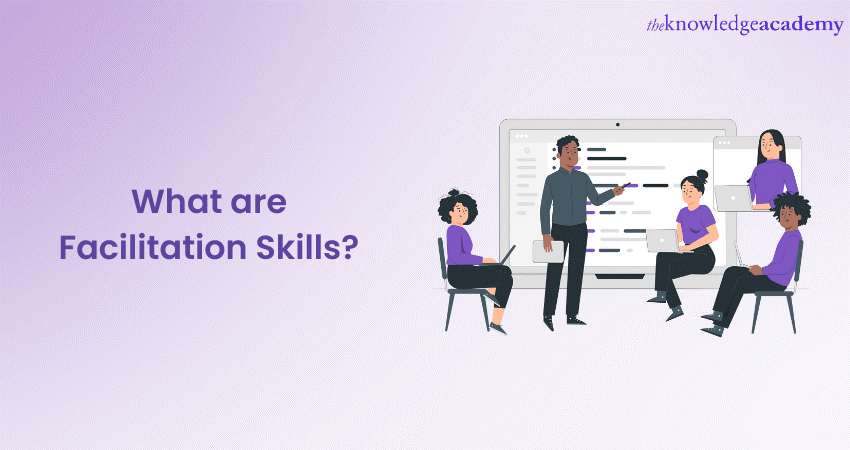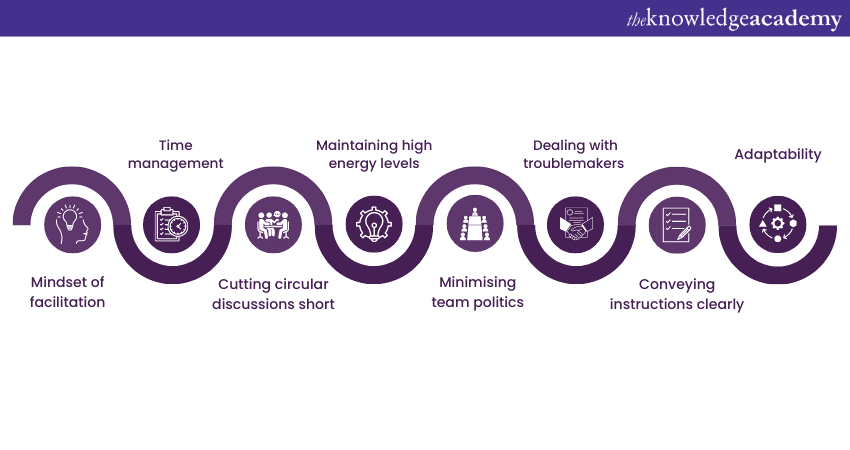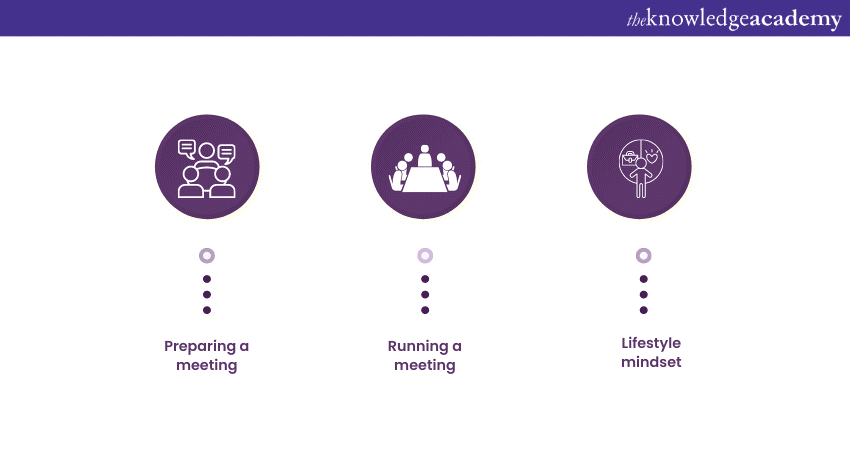We may not have the course you’re looking for. If you enquire or give us a call on 01344203999 and speak to our training experts, we may still be able to help with your training requirements.
Training Outcomes Within Your Budget!
We ensure quality, budget-alignment, and timely delivery by our expert instructors.

Facilitation Skills are vital in many aspects of modern life, from the boardroom to the classroom and even in our daily interactions. These abilities help guide groups towards a common goal, encouraging collaboration, managing conflicts, and ensuring that all voices are heard.
More importantly, the importance of Facilitation Skills is ever-increasing as our world becomes more interconnected and our work more team-oriented. Understanding and mastering these skills is essential for anyone looking to lead, inspire, and connect with others effectively. Discover the power of Facilitation Skills in driving productive group interactions! Learn how to guide discussions, foster teamwork, and achieve successful outcomes.
Table of Contents
1) An introduction to Facilitation Skills
2) Looking at the various Facilitation Skills
a) Mindset of facilitation
b) Time management
c) Cutting circular discussions short
d) Maintaining high energy levels
e) Minimising team politics
f) Dealing with troublemakers
g) Conveying instructions clearly
h) Adaptability
3) Exploring the situations to utilise Facilitation Skills
4) Conclusion
An introduction to Facilitation Skills
Facilitation Skills are a unique set of abilities that individuals require to guide a group towards achieving a collective goal. These skills encompass a range of aspects, including communication skills to foster understanding and Managing Conflict, leadership skills to motivate and inspire others. They also need to possess problem-solving skills to manage disagreements and challenges that arise within the group.
Additionally, Facilitators must possess Decision-Making skills to guide the team towards consensus. These skills are not confined to the business world; they're valuable in any scenario that involves group dynamics, such as personal interactions, social events, and community gatherings.
Now, with increasing remote work and online meetings, Facilitation Skills have extended into the digital realm, requiring an understanding of virtual platforms and online group dynamics. Ultimately, these skills lead to more productive meetings, improved collaboration, and better group dynamics.
Overview of the Facilitator’s role
The role of a Facilitator is akin to that of an Orchestral Conductor, where the group’s harmony is ensured to achieve their common objective. Facilitators typically guide the group discussions, thereby fostering an environment where each participant is empowered to contribute their ideas and thoughts.
Additionally, their responsibilities involve maintaining focus on the group’s goal, managing the group’s dynamics, Conflict Resolution, and ensuring that the decisions are made effectively. They are proficient communicators, able to clarify misunderstandings and guide the dialogue.
Despite facilitating the decision-making process, Facilitators remain neutral, thereby being careful not to impose their own views but allowing the group to reach a consensus. Their role further extends beyond the meeting room into the digital space, where they navigate the distinct challenges of virtual meetings.
Looking at the various Facilitation Skills
Here is a descriptive list of the various Facilitation Skills that make a good Facilitator:

Mindset of facilitation
The mindset of facilitation is pivotal in the principle of enabling groups to work effectively together towards their shared objectives. A Facilitator should approach every situation with an open mind, demonstrating respect for diverse opinions, fostering a positive atmosphere and promoting equal participation.
Additionally, a cornerstone of this mindset is neutrality; Facilitators must keep their personal opinions aside to ensure unbiased group decisions. They must also exhibit adaptability, as facilitation involves dealing with unexpected problems or conflicts that may arise.
Furthermore, patience and a deep understanding of human nature are key to managing these situations successfully. Finally, a Facilitator must maintain a growth mindset, viewing each meeting as an opportunity to learn and improve their facilitation skills. They are capable of driving more productive group discussions, inspiring a culture of collaboration and ensuring successful project outcomes.
Time management
One of the essential Facilitation Skills is the ability to manage circular discussions, those conversations that loop back on themselves without any progress towards resolution. These discussions can consume a lot of time and energy and hinder the group's ability to achieve its objectives.
Moreover, Facilitators must be able to identify when a discussion is becoming circular and have the tact and strategy to guide it back on track. This could involve summarising the key points made so far, refocusing the group on the original objective, or proposing a break for participants to reflect.
Sometimes, it might also mean redirecting the conversation to a different but related topic to gain new perspectives. These actions require a keen understanding of group dynamics and strong communication skills.
Motivate your team and improve performance by signing up for the Successful People Management and Team Leadership course now!
Cutting circular discussions short
One of the essential Facilitation skills is the ability to manage circular discussions, those conversations that loop back on themselves without any progress towards resolution. These discussions can consume a lot of time and energy and hinder the group's ability to achieve its objectives.
Additionally, Facilitators must be able to identify when a discussion is becoming circular and have the tact and strategy to guide it back on track. This could involve summarising the key points made so far, refocusing the group on the original objective, or proposing a break for participants to reflect.
Sometimes, it might also mean redirecting the conversation to a different but related topic to gain new perspectives. These actions require a keen understanding of group dynamics and strong communication skills.
Maintaining high energy levels
Another one of the many Facilitation Skills that every facilitator must possess is the ability to maintain high energy levels. They must ensure that the team stays energised in terms of engagement, creativity and productivity. These three aspects must be maintained through the group meetings or activities that they partake in.
Additionally, the skill particularly involves a good perception of the group’s energy dynamic. A good perception entails a knack for recognising when the energy levels wane, followed by the ability to reinvigorate the participants.
Further techniques might include introducing engaging activities, varying the pace of the session, encouraging participation through questions, or even using humour to lighten the mood.
More importantly, one facet of such a Facilitator is to understand the various personalities involved and how to connect with them. Now, effective Facilitators create a positive and lively environment that fosters active collaboration, making the process enjoyable and the goals achievable.
Minimising team politics
A Facilitator should have the ability to keep the team’s politics to a minimum because such a team atmosphere can generate divides, hinder collaboration and steer the group away from its objectives.
Additionally, Facilitators with adept facilitation skills are trained to identify underlying political currents within the group and tactfully address them. This may involve creating a safe space where all voices are heard equally, establishing clear guidelines for respectful dialogue, or directly addressing the issue if it becomes disruptive.
Moreover, Facilitators also employ techniques such as neutrality and impartiality to ensure that all participants feel fairly treated. By focusing on common goals and fostering a sense of unity, Facilitators can shift the attention away from personal agendas and political manoeuvring.
Dealing with troublemakers
The ability to deal with members causing rifts among members in the group is also a skill that requires a degree of delicacy involving some refined Facilitation Skills. Such members may disrupt the group’s flow of discussion and even challenge or question the facilitator’s authority. These malpractices translate to a tense atmosphere within the group.
Additionally, the mark of a seasoned facilitator is their ability to utilise different techniques to handle such individuals without alienating them or letting them derail the group’s focus. Now, some of these facilitation skills include setting clear ground rules at the outset and addressing disruptive behaviour calmly and respectfully.
Moreover, they also employ active listening to understand the underlying concerns or frustrations of the individual. Sometimes, a private discussion with the troublemaker may be necessary to address issues without embarrassing them in front of the group.
Manage conflicts effectively to maintain your team’s dynamic, by signing up for the Conflict Management Training now!
Conveying instructions clearly
Conveying instructions clearly is an integral part of facilitation and requires well-honed facilitation skills. Whether guiding a team through a complex task or directing a meeting, the ability to communicate instructions unambiguously is essential for success.
Additionally, skilled Facilitators use concise language, avoiding jargon that might create confusion. They often break down complex instructions into manageable parts, explaining step-by-step and checking for understanding as they proceed. Utilising visual aids like charts or slides and encouraging questions or feedback can further enhance clarity.
More importantly, these facilitation skills are not just about what is said but also how it's said. The Facilitator's tone, body language, and pace play vital roles in ensuring that the message is received as intended. A seasoned Facilitator is adept at preventing misunderstandings and resolving conflicts, paving the path for a meaningful and smoother process.
Adaptability
Another key attribute of a seasoned facilitator is adaptability, which is utilised in combination with other Facilitation Skills that allow a facilitator to respond in an effective manner to unexpected changes or challenges. Now, a group’s dynamic can face rapid shifts, calling for the facilitator to readjust the group’s content and pace on the go.
Additionally, skills such as active listening, empathy, and quick problem-solving come into play because a Facilitator must be alert to subtle cues, able to read the room, and ready to employ various techniques to keep the group on track towards its objectives.
More importantly, a Facilitator who embodies these qualities can navigate complex and evolving situations with grace and efficiency, ensuring that the group's goals are met despite any unexpected challenges.
Exploring the situations to utilise Facilitation Skills
Facilitation Skills are versatile and can be utilised across many situations, including business meetings, community gatherings, educational settings, and Conflict Resolution scenarios.
They encompass communication, leadership, adaptability, and problem-solving abilities that enable individuals to guide groups effectively towards shared goals. Such situations are described below as follows:

Preparing a meeting
Facilitation Skills play a crucial role in preparing for a meeting. They involve understanding the objectives of the meeting, identifying the participants' needs, and setting a clear agenda. Skilled Facilitators can create an environment that fosters open communication by laying down ground rules and ensuring that everyone is given the opportunity to speak.
Moreover, the use of facilitation skills also aids in planning engaging activities, managing time effectively, and structuring the meeting to keep it on track. From determining the format and content to ensuring that the meeting's goals are aligned with the participants' expectations, facilitation skills are vital in crafting a successful and productive meeting.
Running a meeting
Facilitation Skills are instrumental in running a meeting effectively. These skills ensure that the agenda is followed, time is managed efficiently, and all participants have an opportunity to contribute.
Additionally, a Facilitator uses communication skills to foster collaboration, actively listens to understand different perspectives, and employs conflict resolution techniques when disagreements arise.
Moreover, by maintaining a neutral stance and guiding the group towards consensus, the Facilitator helps the team stay focused on the meeting's goals. Whether in a business setting or community forum, facilitation skills create an inclusive environment that encourages productive dialogue, leading to successful outcomes.
Improve your relationships through effective communication, by signing up for the Effective Communication Skills course now!
Lifestyle mindset
Facilitation Skills extend far beyond professional settings and can be adopted as a lifestyle mindset, influencing how we interact with others in daily life. This mindset fosters open communication, empathy, and collaboration, encouraging understanding and cooperation in personal relationships, family dynamics, and community interactions.
Additionally, by applying Facilitation Skills, one can manage disagreements with grace, guiding conversations towards constructive resolutions rather than conflicts. These skills promote active listening, where we genuinely seek to understand others' viewpoints rather than merely waiting for our turn to speak.
Moreover, the ability to adapt to unexpected situations with poise, maintain a neutral stance, and encourage inclusive participation are aspects that can enhance social engagements and personal relationships. Embracing facilitation as a lifestyle mindset means building bridges, creating more harmonious interactions, and enriching connections with those around us.
Conclusion
You now understand how Facilitation Skills are an indispensable tool in today's interconnected world. They not only enable effective management of group dynamics in professional settings but also enrich personal and social interactions. From guiding meetings to resolving conflicts and fostering a collaborative environment, facilitation skills promote understanding, empathy, and efficiency.
Assist individuals and groups to collaborate effectively, by signing up for our Facilitation Skills Training now!
Frequently Asked Questions
Upcoming Business Skills Resources Batches & Dates
Date
 Facilitation Skills Training
Facilitation Skills Training
Fri 21st Jun 2024
Fri 2nd Aug 2024
Fri 18th Oct 2024
Fri 20th Dec 2024







 Top Rated Course
Top Rated Course



 If you wish to make any changes to your course, please
If you wish to make any changes to your course, please


